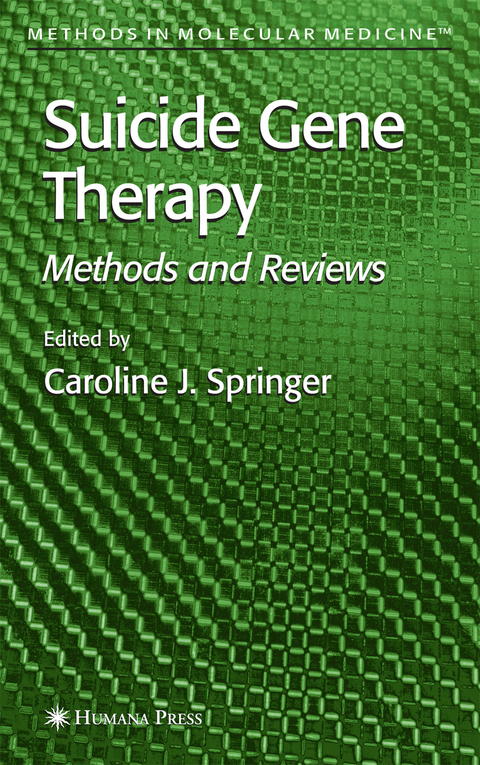
Suicide Gene Therapy
Humana Press Inc. (Verlag)
978-1-61737-283-4 (ISBN)
Gene therapy has expanded rapidly over the last decade. The number of clinical trials reported by 2001 included 532 protocols and 3436 patients. Phase I trials predominate with 359 trials of 1774 patients versus Phase II (57 trials with 507 patients) and Phase III (3 trials of 251 patients). The disease overwhelmingly targeted by gene therapy is cancer: involving 331 trials with 2361 patients. Despite the somewhat disappointing results of clinical trials to date, gene therapy offers tremendous promise for the future of cancer therapy. The area of gene therapy is vast, and both malignant and nonmalignant cells can be targeted. Suicide Gene Therapy: Methods and Reviews covers gene therapy that targets malignant cells in a treatment that has become known as “suicide gene therapy. ” Basically, this approach uses the transduction of cancer cells with a gene for a foreign enzyme that, when expressed, is able to activate a nontoxic prodrug into a highly cytotoxic drug able to kill the cancer cell population. This is a major area in cancer gene therapy—in 2001 this technique was represented by 52 clinical protocols with a total of 567 patients. Additional trials used multiple gene therapy protocols that also involved suicide gene therapy (83 with 497 patients), indicating that the interest in this area is considerable. Suicide Gene Therapy: Methods and Reviews aims to cover comprehensively, both in theoretical and practical terms, the rapidly evolving area of suicide gene therapy for cancer.
to the Background, Principles, and State of the Art in Suicide Gene Therapy.- to Vectors for Suicide Gene Therapy.- Construction of VNP20009.- Nonreplicating DNA Viral Vectors for Suicide Gene Therapy.- Replication-Selective Oncolytic Adenoviruses.- Retroviral Vectors for Suicide Gene Therapy.- Nonviral Liposomes.- Peptide- and Polymer-Based Gene Delivery Vehicles.- Design of Prodrugs for Suicide Gene Therapy.- Cytochrome P450-Based Gene Therapies for Cancer.- Tumor Sensitization to Purine Analogs by E. coli PNP.- Enzyme-Prodrug Systems.- Enzyme-Prodrug Systems.- Methods to Improve Efficacy in Suicide Gene Therapy Approaches.- Extracellular ?-Glucuronidase for Gene-Directed Enzyme-Prodrug Therapy.- Enhancement of Suicide Gene Prodrug Activation by Random Mutagenesis.- Combination Suicide Gene Therapy.- Immune Response to Suicide Gene Therapy.- Targeting Cancer With Gene Therapy Using Hypoxia as a Stimulus.- Radiation-Activated Antitumor Vectors.- In Vitro and In Vivo Models for Evaluation of GDEPT.- Suicide Gene Therapy in Liver Tumors.- Clinical Trials With GDEPT.- The Nitroreductase/CB1954 Enzyme-Prodrug System.- Side Effects of Suicide Gene Therapy.- Antibody-Directed Enzyme-Prodrug Therapy.- Bioreductive Prodrugs for Cancer Therapy.
| Erscheint lt. Verlag | 9.11.2010 |
|---|---|
| Reihe/Serie | Methods in Molecular Medicine ; 90 |
| Zusatzinfo | XIV, 555 p. |
| Verlagsort | Totowa, NJ |
| Sprache | englisch |
| Maße | 152 x 229 mm |
| Themenwelt | Medizin / Pharmazie ► Medizinische Fachgebiete ► Onkologie |
| ISBN-10 | 1-61737-283-8 / 1617372838 |
| ISBN-13 | 978-1-61737-283-4 / 9781617372834 |
| Zustand | Neuware |
| Haben Sie eine Frage zum Produkt? |
aus dem Bereich


